Adam Curtis’ video “Bitter Lake” has an interesting little aside about some unexpected effects of geo-engineering in Helmand Province, Afghanistan. It raised the water table, which raised salinity closer to the surface of farmlands, which had the result of killing certain crops, but not others.
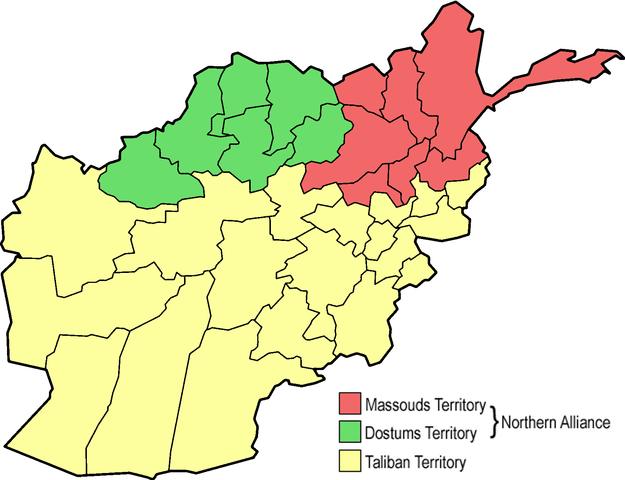
Power in Afghanistan, 1996
If you remember back when the US was taking over Afghanistan, the CIA and special operations forces were putting their money and airstrikes behind the “Northern Alliance” – basically, the other side of a civil war between the Pakistani-influenced islamic southern provinces and the northern provinces. Basically, the US put its weight behind the Northern Alliance because they were the other side from the Taliban; the Northern Alliance also comprised some of the resistance against the Russian Occupation so they had some attractive though meaningless anti-communist credentials.
Once the main phase of the war ended, the US (British were originally in the south) pacification efforts shifted toward keeping the south from re-Talibanizing.* US forces are still responsible for propping up the tribal leaders that maintain their allegiance to the official Afghan government in Kabul (center upper right of the country) Whenever you’ve read, in the last few years that the war has dragged on, about insurgents gaining power in the distant provinces, they’re talking about Helmand, mostly.
So, the US military apparently spends a lot of time protecting this:
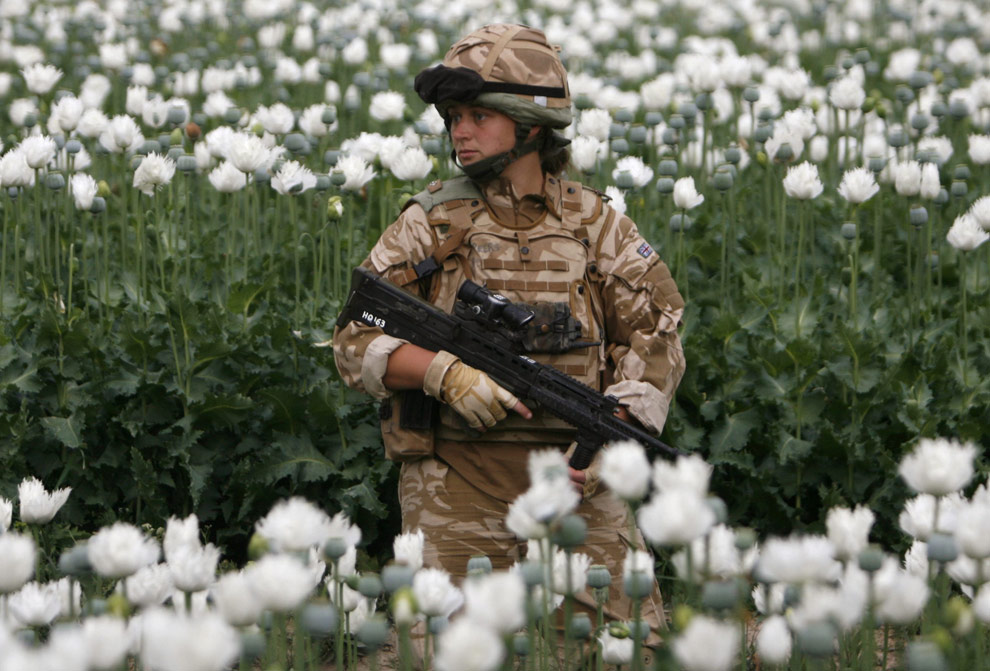
And it’s 1, 2, 3, what are we fighting for? (That’s not a US soldier, I know)
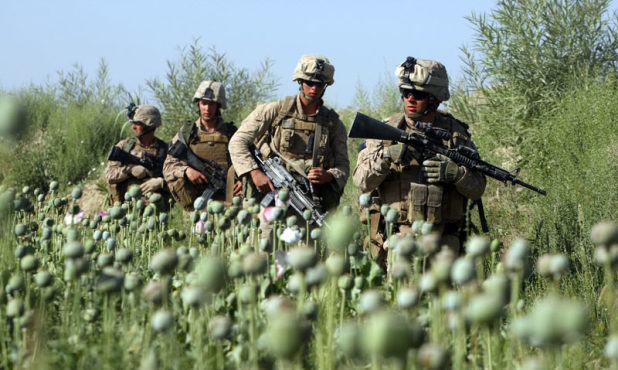
Defending the Oxycodone
Just do a few google image searches for “US Troops opium afghanistan” and your head will explode. Apparently the troops are spending a lot of time marching around through “Afghan fields where poppies gro'”
In order to appease the local power structure and keep them from peeling away to support the Taliban, it’s necessary to keep insurgents from taking over their livelihood.

US Marines wading through opium poppies
Back to “Bitter Lake” – I forgot to mention that part: When the US-built hydrologic projects salinized the soil, it made the main crop of southern Afghanistan: Papaver Somniferium. It’s sunny, it’s dry, it’s silt-filled valleys with perfect soil for them.
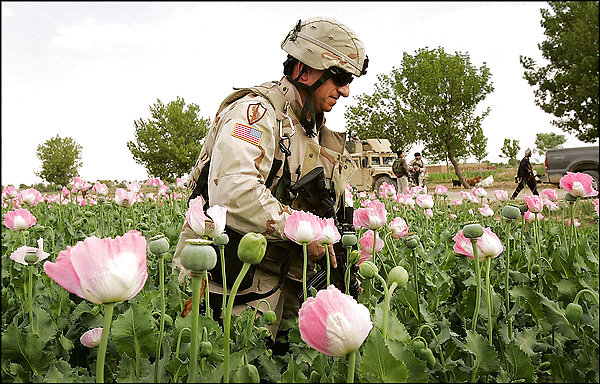
Record numbers of opiate overdoses, especially heroin. Surprised?
They’re a lot prettier than the rice paddies in Vietnam, aren’t they?
A friend of mine, who I consider highly credible, told me a rather amazing story the other day. I did a bit of ferretting around to see if I could confirm or disprove any of it, but I came up dry. So I’ll tell you this, but you should consider it “hearsay” – apparently medicinal production of opiates is (understandably) heavily regulated and licensed. And the main licensee is: House Windsor. It sounds like a bit of the old remnant from the opium wars, but if it’s true, it represents vast, vast amounts of money. If it’s true, it would also explain why it’s so hush-hush.
The unregulated fields of Afghanistan are competitors, I suppose.
It really is amazing that more troops aren’t dying of opiate abuse. That’s not to say that lots aren’t:
Just outside the main gate to Bagram airfield, a U.S. military installation in Afghanistan, sits a series of small makeshift shops known by locals as the Bagram Bazaar. For Afghans, it is the place to buy American goods, but the stalls that make up the heart of the bazaar are also well known for what they provide American soldiers stationed at Bagram. Walking through the bazaar it takes less than 10 minutes for a vendor in his early 20s to step out and ask, “You want whiskey?” “No, heroin,” I tell him. He ushers me into his store with a smile. (Salon)
The US military and Veterans Administration aren’t talking much about heroin addiction and whether that’s a problem. But worldwide, the number of heroin addicts has doubled in the last 5 years as heroin has gotten cheaper and more accessible.
Marines discussing poppies with a farmer
Opium farmer Haji Abdul Khan shows off damaged poppies to U.S. Marines and their military interpreter on March 22, 2009 near remote Qalanderabad in southwest Afghanistan. The opium poppy field was damaged when a U.S. Air Force airdrop of supplies blew off target, landing on some of Khan’s crops and crushing them. The Marines assured Khan they would pay him for his damaged poppy crop in compensation for the accident. (source) (emphasis added)
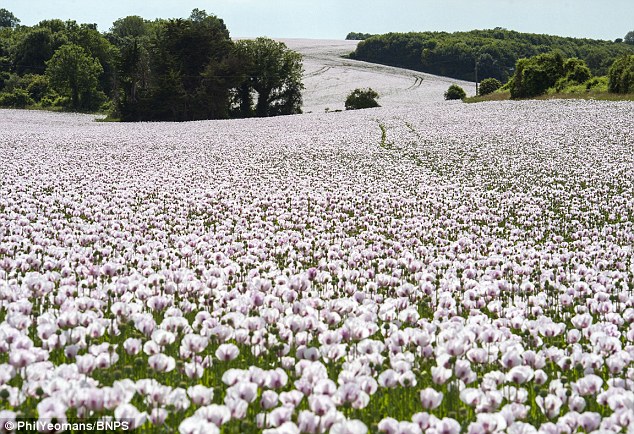
Dorset, UK
That’s Dorset, in the UK. Shh, don’t tell anyone. Their crop doesn’t look as good as the Afghani stuff, it’s probably cold and damp in England.

Bitter Lake: Start at 20:52

I stumbled across the first picture of soldiers in a field of poppies because I was google image-searching for “soldiers fields of poppies” with reference to WWI/Flanders. You can imagine how gobsmacked I was.
Refworld: UNHCR Background on the Northern Alliance (By the way, the Northern Alliance included Jamiat Al-Islam, which is now known as “Islamic State” – the US prefers to talk about ISIL “Islamic State in Levant” so as to be able to pretend that the CIA did not infuse funds into the movement that has become such a problem in Iraq and Syria.)
Daily Mail: A bumper crop of opium poppies in Dorset
Globalresearch: Drug War?
Salon: It’s easy for soldiers to score heroin in Afghanistan
(* Tora Bora is down right on the border to the South/East, near the two angled regions right above the legend reading “Massoud’s Territory. Osama Bin Laden was hiding out in Tora Bora and walked across the border at night while the US bombed the mountains.)

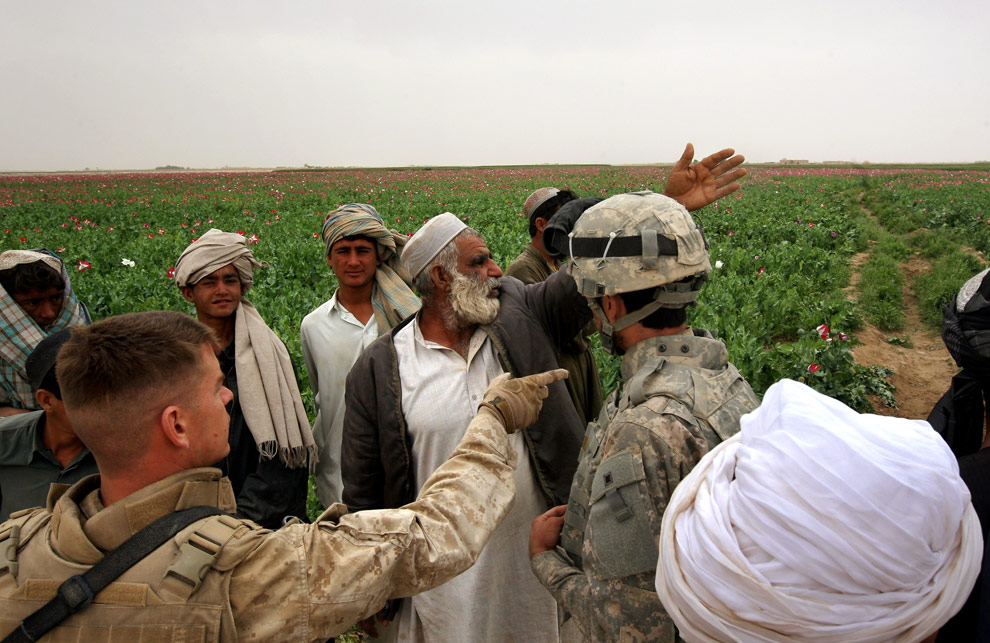
Funny how after you mentioned the top soldier wasn’t American the easiest way for me to guess what country she represented was the L85 rifle she’s carrying.
timgurguen@#1:
Same here!
Same gang that ran smack in Vietnam
Ain’t got no reason to fear
Just get a vice president so dumb
The crook at the top never gets impeached
Oops, sorry, that was about Bush I and Dan Quayle running drugs in central America to fund their terrorist friends there…
I’m genuinely surprised that you’re surprised by any of this.
Also, while the NA did include some anti-Russian factions, the main military man was General (now Vice President) Dostum, who was decidedly pro-Soviet during the relevant period, and notorious for his enjoyment of various imaginative forms of torture and execution.
Dunc@#3:
I’m not “surprised” exactly. I just didn’t put any thought into it. What surprised me was what came back from my query; I was expecting pictures of WWI battlefields.
Back in the Reagan days, stories went around about the CIA helping certain entrepreneurial Afghans to set up refining labs for their famous local crop – they needed no assistance in marketing the product to occupying Soviet troops. In that way, as in so many others, the USSR “got its own Vietnam”, exactly as Z. Brzezinski (“the Democrats’ Kissinger”) promised the virtuous human-rights-loving James Earl Carter.
For about fifteen years, I’ve waited to hear of the same hospitality being offered to the Afghans’ new guests, but even returning vets who spoke freely of other operational mishaps professed ignorance of such business. (Well, I didn’t ask them about assisting in local floriculture, the more fool me.) Now, I have to wonder what changed lately that this is occurring/leaking at last.
Oh yes, about the salinity of the Afghan water table – another thing returning US vets have told me they never heard of is Band-I-Amir, a geological marvel high in the mountains of Bamiyan province – a series of six lakes so saline as to make the Dead Sea resemble the freshest of Florida’s springs.
Somewhere back even before the Flintstones, as the Hindu Kush rose in response to tectonic pressures, it seems some gigantic salt deposits dried out and were buried in what is now Afghanistan. As spring melts the snowmelt (locals in the relatively mild Bamiyan Valley told me, in the late ’70s before the shooting started, that ten meters of snow was considered a mild winter – and they’re quite a ways lower than Band-i-Amir), it carries a load of dissolved minerals with it until captured by a natural basin.
Each lake seasonally deposits a “ring” of encrusted minerals, year after year, building up walls of calcium carbonate (and more) 30-40 feet high that hold the waters back, with the bottom-most spilling a waterfall sufficient to power a watermill of big rough-hewn local stones with which the locals grind their (scanty) wheat crops. The waters of these lakes shine with a blue intensity matching or surpassing anything I’ve seen in the Mediterranean. Reportedly, the residents pay for this beauty with kidney problems that kill virtually all of them before the age of 50.
Pierce R. Butler@#6:
Each lake seasonally deposits a “ring” of encrusted minerals, year after year, building up walls of calcium carbonate (and more) 30-40 feet high
That’s super interesting!! I can’t imagine how horrible it is to have an entire community suffering gout and kidney stones as a matter of course. Arrgh, there’s an application for solar desalinization if I ever heard of one!
The Adam Curtis video (a minute or so after the part I linked) has some shots of the Helmand dam and the water is that weird silicate blue of carbonate; it didn’t even occur to me that anyone’d drink it. But of course they do. There’s a similar color to the water at The Blue Lagoon in Iceland – I’ve tasted that water (accidentally) and it’s awful and it is weirdly slippery-feeling.
Pierce R. Butler@#5:
Back in the Reagan days, stories went around about the CIA helping certain entrepreneurial Afghans to set up refining labs for their famous local crop – they needed no assistance in marketing the product to occupying Soviet troops. In that way, as in so many others, the USSR “got its own Vietnam”,
I’d heard similar. Wikipedia agrees. Ergo, it must be so.